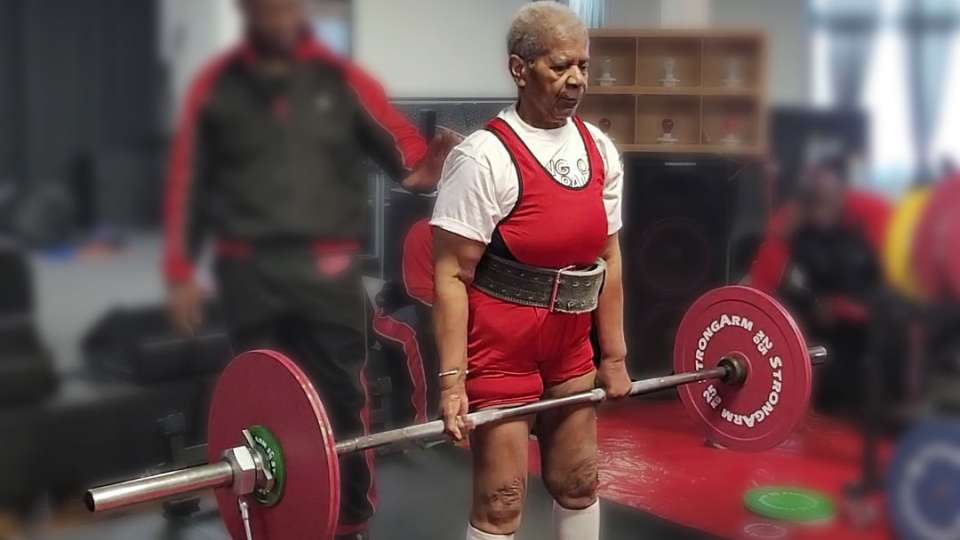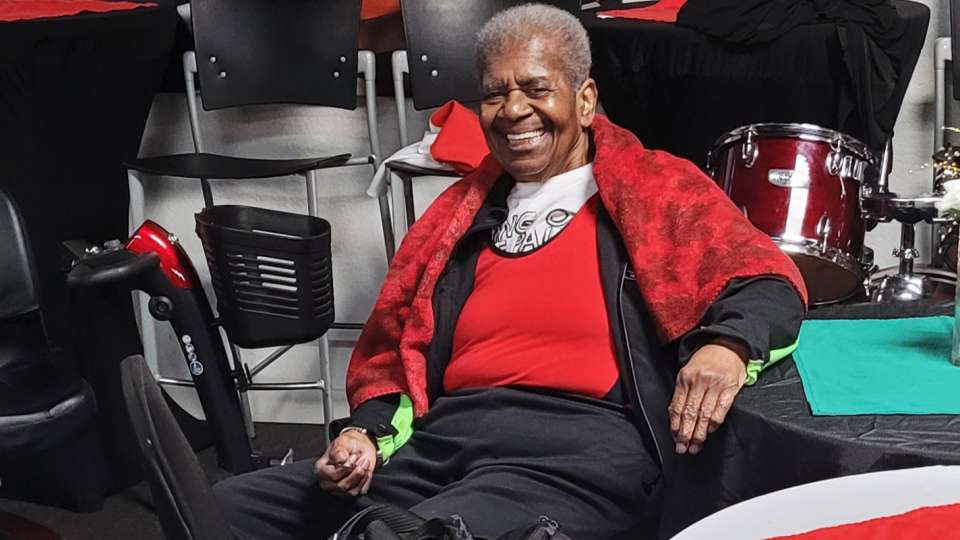
For Winifred Pristell, 85, powerlifting isn’t just a hobby — it’s an identity. Pristell is a grandmother of three and a great-grandmother of six. She is also a world-champion weightlifter.
“I’m not a typical great-grandmother,” she says.
In her 40s, following a career as a barber, Pristell was overweight and couldn’t walk more than four blocks. In an effort to get her moving, Pristell’s daughter took her to a local gym. There, she saw someone lifting weights.
“I want to do that,” she said.
A second act as a powerlifting champion
She started with dumbbells. Eventually, she could deadlift about 65 pounds and bench the bar. At around age 60, she decided to participate in an unofficial weightlifting competition at the YMCA in Seattle, where she worked out at the time. That was the first time her son, Roosevelt, remembers seeing what she could do.
“What are they doing, trying to kill her?” Roosevelt thought to himself when he saw how much weight she was about to lift. “Then she lifted it and beat everyone younger than her at the competition.”
Roosevelt, who is also a weightlifter, encouraged his mother to find a coach at a more serious gym. From there, Pristell’s career took off. Her first sanctioned event was in 2006 in Aberdeen, Washington, where she competed in benching. She remembers a seasoned competitor who looked at her and marveled, “Pound-for-pound, you are stronger than me!”
“I won,” Pristell says.
She went on to become a Washington state champion for her division later that summer at the Alki Beach Classic and capped the year with a 165.3-pound bench press at the World Association of Benchers and Deadlifters (WABDL) Championships in Las Vegas, earning her a world title.
She kept going to meets and lifting more weight than most people half her age could. And she kept winning.
“Actually, I’ve never lost,” Pristell says.
In her more than 20-year career, she’s won dozens of competitions, including 26 world titles from the WABDL and the Amateur Athletic Union (AAU). She holds 23 world records with the AAU for her weight and age group, and she has been inducted into both the Washington State Powerlifting Hall of Fame and the Strength and Power Hall of Fame.
Her personal bests include a single lift bench press of 179.6 pounds at age 73 and a deadlift of 278.8 pounds at age 70. In her most recent competition, in May 2024, she deadlifted 203.9 pounds and benched 121 pounds, winning once again.
Persevering through injury
A decade into her journey, Pristell started experiencing pain in her lower back and hip. She didn’t want to stop competing in powerlifting, so she made an appointment with Dr. Brian Krabak, a sports medicine doctor at UW Medicine.
Krabak remembers Pristell walking in and declaring, “Hey doc, I’ve got world’s coming up!”
“I told him I have arthritis everywhere,” she remembers. “I’ve got a strong body, but it needs to be kept together.”
Initially, Pristell was treated for a spinal disc herniation. She also needed a hip replacement due to progressive arthritis, which Krabak and his team helped her avoid for a while. But after a bad fall, it became necessary to do the procedure, which was completed by Dr. Navin Fernando at the Hip & Knee Center at Meridian Pavilion in February 2020.
Most hip replacement rehabilitation focuses on getting back to walking, but Pristell had more ambitious plans — she wanted to lift again. Krabak has helped her and Roosevelt develop a training plan to avoid further injuries while playing to Pristell’s strengths.
“Winnie is very regimented in her training program,” says Krabak. “My role was to listen to her goals and provide suggestions for modifications and interventions like physical therapy, rest and injections. Winnie keeps me posted on the progress.”
She’s made some other changes too, like being more selective about the number of major competitions she attends — only one per year now. And she sometimes uses a walker for balance when she’s going longer distances.
“Dr. Krabak never told her to stop lifting,” says Roosevelt. “He encouraged her to keep doing what she loves, just to ease back into it.”
Pristell, after being severely weakened by the fall and surgery, is now back up to lifting 200 pounds. And she has become a well-known face at the Sports Medicine Center at Husky Stadium. Krabak’s whole team knows and supports her vision to maintain her status as a powerlifting champion.
Her secret to longevity
The big question everyone has for Pristell is how she stays so strong and fit at age 85. There are no other people her age competing in powerlifting in the U.S.
The secrets aren’t so secret, she says. She eats fairly healthily and exercises nearly every day: two days per week at the gym and four days per week at home. When she started walking in her 40s, it took her 42 minutes to walk a mile. Now, she can do it in 26 minutes, walker included. Starting her day off with exercise gives her a strong sense of purpose. She even writes letters to those around her — Krabak included — about her life.
“Winnie has an identity and a passion around it,” Krabak says when asked about how he thinks she’s managed to stay fit as she ages. “There is research that shows how important a purpose and a social network are for living longer. Plus, she’s evidence that with the right setting, motivation and support, you can do almost everything.”
Pristell’s mantra — “It is never given but earned” — is written on the wall of her apartment, next to her medals.
Krabak notes that you can’t just run a marathon or lift 300 pounds right when you start. But Pristell is proof: You don’t have to limit yourself with age as long as you train correctly. Strength training can also help limit strength and flexibility loss as you age, he says, noting that it’s important to work with your doctor or personal trainer to develop a fitness plan tailored to your needs as you age.
Pristell notes with a laugh that if you look her up online, you’ll see things that nobody else has done. She’s been called one of the world’s strongest grandparents and continues to dream big about where her powerlifting career will take her in the next decade.
“People want to be like me, but I hope they know that they should be like themselves,” Pristell says. “This is my passion, but it may not be theirs. Just do what you can do.”

 Healthy ideas for your inbox
Healthy ideas for your inbox






